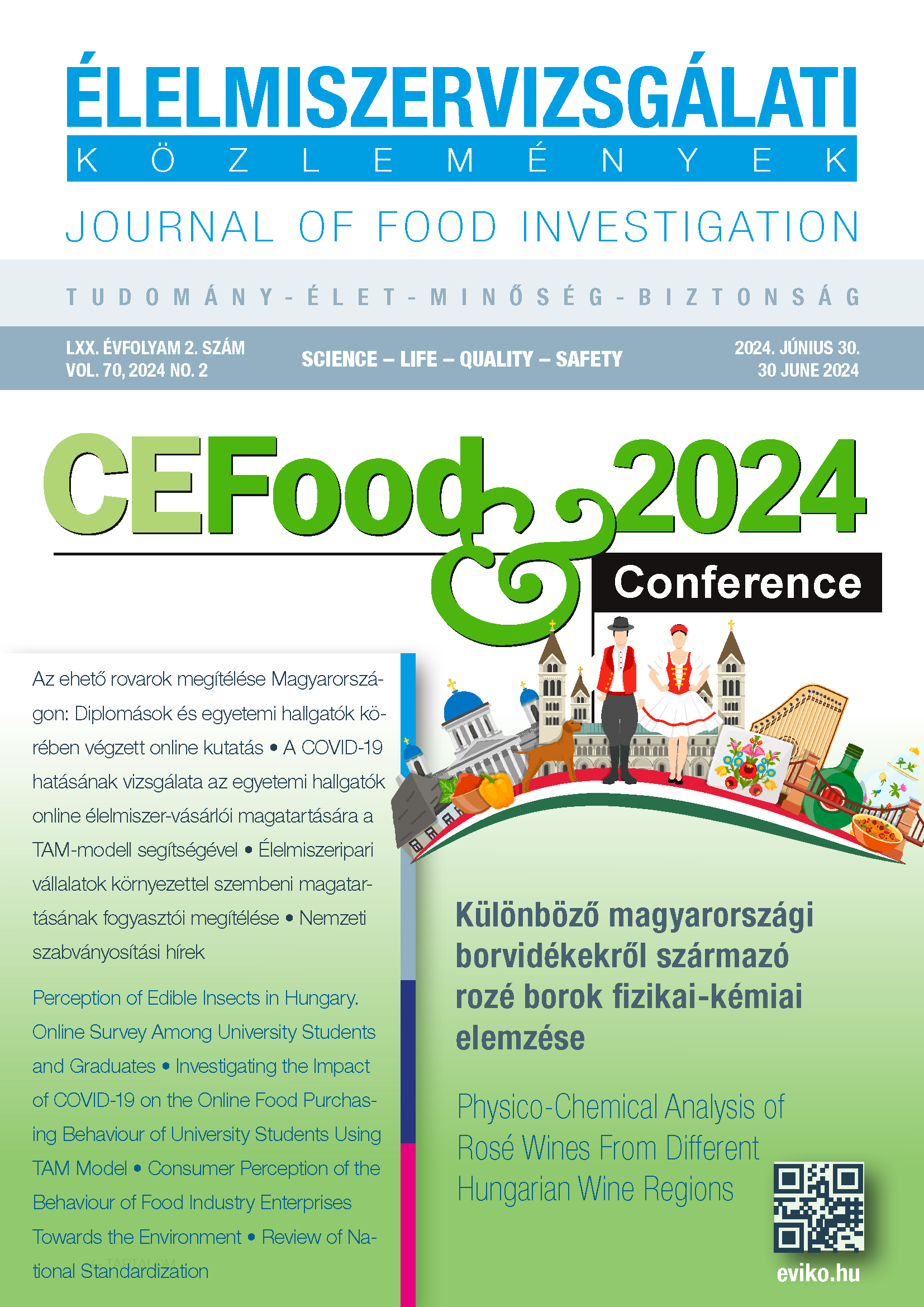Perception of Edible Insects in Hungary Online Survey Among University Students and Graduates
Main Article Content
Abstract
We studied consumer perception of edible insects among university students and fresh graduates in Hungary. Edible insects are alternative protein sources and should be authorised as novel foods in the European Union. There is no history of insect consumption in Europe, where neophobia and lack of information are major barriers to insect eating.
We briefly discuss the history of their consumption, the role they play, regulatory aspects, consumer attitudes measured so far, and how they could be incorporated into the diet. The literature review is followed by the description of our online questionnaire (N=440).
The results clearly demonstrate that the consumers surveyed had very little knowledge about edible insects, but they would be open to try and taste them, in case they had more information. The respondents’ first associations were of disapproval and far-away (exotic) regions, while protein source and sustainability were also mentioned spontaneously. Interestingly, men accepted such a novel food more than women. But no similarly significant differences were observed across age groups, although young people seemed to be more receptive. In case insects would not resemble their original state, but would be presented to consumers in the form of insect flour, powder, or oil, then they would be much more accepting of edible insects. We believe that our study—although it was not representative—should be continued, for example via focus groups with insect tastings.
Downloads
Article Details
References
Bánáti D., Bogueva D., Ovca A. (2024): Consumer perception of edible insects. In: Consumer perceptions of food (Ed.: Bogueva D.). Springer. (accepted for publication)
Bodenheimer FS (1951): Insects as human food; a chapter of the ecology of man. The Hague, Dr. W. Junk Publishers.
Davey GCL (2011): Disgust: The disease-avoidance emotion and its dysfunctions. Philos. Trans. R. Soc.: Bio Sci 366: 3453-3465
Dicke M, Eilenberg J, Salles JF et al. (2020): Edible insects unlikely to contribute to transmission of coronavirus SARS‐CoV‐2. J Insects Food Feed 6: 333-339
Dupont J, Fiebelkorn F (2020): Attitudes and acceptance of young people toward the consumption of insects and cultured meat in Germany. Food Qual Prefer 85: 103983
EFSA (2021): Safety of dried yellow mealworm (Tenebrio molitor larva) as a novel food pursuant to Regulation (EU) 2015/2283. EFSA Journal 19(1): 6343
Egolf A, Siegrist M, Hartmann C (2018): How people’s food disgust sensitivity shapes their eating and food behaviour. Appetite 127: 28-36
EU (2015): EU Regulation (EU) 2015/2283 of the European Parliament and of the Council of 25 November 2015 on Novel Foods, Amending Regulation (EU) No 1169/2011 of the European Parliament and of the Council and Repealing Regulation (EC) No 258/97 of the European Parliament and of the Council and Commission Regulation (EC) No 1852/2001; EU: Brussels, Belgium, 2015. OJEU: L 327/1.
FAO (2013): The contribution of insects to food security, livelihoods and the environment FAO. Rome, Italy. I3264E/1/04.13. https://www.fao.org/edible-insects/en/ (10 May 2023)
FAO (2021): Looking at edible insects from a food safety perspective. Challenges and opportunities for the sector. FAO. Rome, Italy: 1 – 108 https://www.fao.org/documents/card/en/c/cb4094en (12 May 2023)
Fukano Y, Soga M (2021): Why do so many modern people hate insects? The urbanization–disgust hypothesis. Sci Total Environ 777: 146229
Gerhát, P. (2023): Nagyon bizarr, de egészséges dolog terjed az éttermek kínálatában. https://divany.hu/testem/rovar-feherje/
Hartmann C, Shi J, Giusto A et al. (2015): The psychology of eating insects: A cross-cultural comparison between Germany and China. Food Qua Prefer 44: 148-156
Kostecka J, Konieczna K, Cunha LM (2017): Evaluation of insect-based food acceptance by representatives of Polish consumers in the context of natural resources processing retardation. J Ecol Eng 18:166–174
Lange KW, Nakamura Y (2021): Edible insects as future food: chances and challenges. Future Foods 1(1): 38-46
Leroy F, Abraini F, Beal T et al. (2022): Animal board invited review: animal source foods in healthy, sustainable, and ethical diets-an argument against drastic limitation of livestock in the food system. Animal 16(3): 100457
Looy H, Dunkel FV, Wood JR (2014): How then shall we eat? Insect-eating attitudes and sustainable foodways. Agric. Hum. Values 31: 131–141
Matandirotya NR, Filho WL, Mahed G et al. (2022): Edible Insects Consumption in Africa towards Environmental Health and Sustainable Food Systems: A Bibliometric Study. IJREPH 19(22): 14823
Megido RC, Gierts C, Blecker C et al. (2016): Consumer acceptance of insect-based alternative meat products in Western countries. Food Qual Prefer 52: 237–243
Meyer-Rochow VB, Kejonen A (2020): Could western attitudes towards edible insects possibly be influenced by idioms containing unfavourable references to insects, spiders and other invertebrates? Foods 9: 172
Morrisons (2022): Morrisons becomes first supermarket to launch its own carbon neutral eggs. https://www.morrisons-corporate.com/media-centre/corporate-news/morrisons-becomes-firstsupermarket-to-launch-its-own-carbon-neutral-eggs/#:~:text=In%20stores%20now%2C%20Morrisons%20new,bakery%2C%20fruit%20and%20vegetable%20sites (02 Aug 2022).
Nakai J, Totani Y, Hatakeyama D et al. (2020): Another example of conditioned taste aversion: Case of snails. Biology 9: 422
Quintieri L, Nitride C, De Angelis E et al. (2023): Alternative Protein Sources and Novel Foods: Benefits, Food Applications and Safety Issues. Nutrients 15: 1509
Ramos-Elorduy J (2009): Anthropo-entomophagy: Cultures, evolution and sustainability. Entomol Res 39(5): 271–288
Ramos-Elorduy J, Menzel P (1998): Creepy crawly cuisine: the gourmet guide to edible insects. Inner Traditions / Bear & Company. p. 44.
Rozin P, Fallon AE (1987): A perspective on disgust. Psychol Rev 94: 23-41
Sogari G, Bogueva D, Marinova D (2019): Australian consumers’ response to insects as food. Agriculture 9: 108.
Tuhumury HCD (2021): Edible insects: Alternative protein for sustainable food and nutritional security. IOP Conference Series: Earth and Environmental Science 883: 012029
Valadez AR (2003): La domesticación animal. UNAM, Instituto de Investigaciones Antropológicas, Plaza y Valdés Editores, México City.
Verbeke W (2015): Profiling consumers who are ready to adopt insects as a meat substitute in a Western society. Food Qual Prefer 39: 147–155
Yen AL (2015): Insects as food and feed in the Asia Pacific region: current perspectives and future directions. J Insects Food Feed 1(1): 33-55

